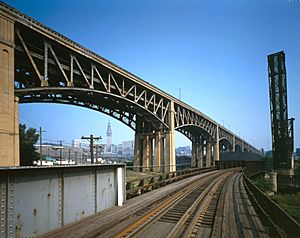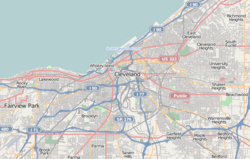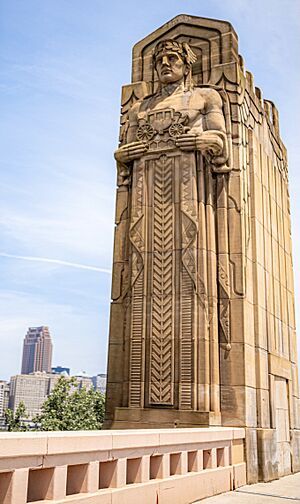Hope Memorial Bridge facts for kids
Quick facts for kids Hope Memorial Bridge |
|
|---|---|

The Lorain–Carnegie Bridge in 1988
|
|
| Coordinates | 41°29′22″N 81°41′37″W / 41.489407°N 81.693554°W |
| Carries | |
| Crosses | Cuyahoga River |
| Locale | Cleveland, Ohio |
| Characteristics | |
| Design | Art deco truss bridge |
| Total length | 1,368.55 meters (4,490.0 ft) |
| Longest span | 69.80 meters (229.0 ft) |
| Clearance below | 28.3 meters (93 ft) |
| History | |
| Construction end | 1932 |
|
Lorain-Carnegie Bridge
|
|
| Location | Spans Cuyahoga River between Lorain and Carnegie Aves., Cleveland, Ohio |
| Area | 8.5 acres (3.4 ha) |
| Built | 1927 |
| Architectural style | Art Deco, cantilever deck truss bridge |
| NRHP reference No. | 76001398 |
| Added to NRHP | October 8, 1976 |
The Hope Memorial Bridge is a really long bridge in Cleveland, Ohio. It used to be called the Lorain–Carnegie Bridge. This bridge is a special type called an art deco truss bridge. It stretches 5,865-foot-long (1,788 m) over the Cuyahoga River.
The bridge connects Lorain Avenue on the west side of Cleveland with Carnegie Avenue on the east side. It ends close to Progressive Field, which is a famous baseball park. You'll see giant statues on tall pillars at each end of the bridge. These statues are called the "Guardians of Traffic." They were designed by sculptor Henry Hering and architect Frank Walker. These guardians represent how transportation has grown and improved over time.
Contents
Building the Bridge
How the Bridge Was Built
People decided to build the bridge in 1921. They voted to use special money called a bond issue to pay for it. However, building the bridge didn't start right away. There were some disagreements about how to spend the money, which caused delays for several years.
The bridge was finally finished in 1932. It cost about $4.75 million at that time. That would be a lot more money today! The bridge stands 93 foot (28 m) above the water. This height allows large ships to pass underneath without hitting the bridge.
A Deck That Was Never Used
The bridge was designed to have two levels. The lower level was meant for trucks and other commercial vehicles. However, this lower deck was never actually used for traffic.
Bridge History and Name
Becoming a Historic Place
The Hope Memorial Bridge is very important because of its history and design. On October 8, 1976, it was added to the National Register of Historic Places. This means it's recognized as a special landmark that should be protected.
Before it became a historic place, there was a disagreement. A county engineer wanted to remove the famous pillars with the "Guardians of Traffic" statues. He thought they were ugly and should be torn down to make the bridge wider. Luckily, the bridge was saved and renovated in the early 1980s.
Renaming the Bridge
On September 1, 1983, the bridge got a new name: the "Hope Memorial Bridge." Before that, it was known as the Lorain–Carnegie Bridge. At first, people said the new name honored William Henry "Harry" Hope. He was a local stonemason who helped build the "Guardians of Traffic" sculptures. He was also the father of the famous comedian Bob Hope, who used to live in Cleveland.
Over the years, there have been different ideas about who the bridge's name truly honors. Some people think it was named just for Bob Hope. Others believe it honors the entire Hope family. And some say it recognizes Harry Hope along with all the other workers who helped build the giant sandstone pillars.
Modern Updates and Wildlife
New Path and Lighting
On December 10, 2012, a new path was opened on the north side of the bridge. This path is 14.5-foot-wide (4.4 m) and is for people to walk or bike on. As part of this project, new lights were also added to shine on the "Guardians of Traffic" statues.
Peregrine Falcons Under the Bridge
Did you know that a pair of peregrine falcons lives under the bridge? These amazing birds have made the bridge their home!
A Place for Peaceful Gatherings
During the 2016 Republican National Convention, the bridge was used for a peaceful event. A group called "Circle the City with Love" gathered there. They held hands and stood in silence. This event was meant to promote love and reflection in the city.
Images for kids
-
East end of bridge in relation to Progressive Field (2013)
 | Toni Morrison |
 | Barack Obama |
 | Martin Luther King Jr. |
 | Ralph Bunche |






